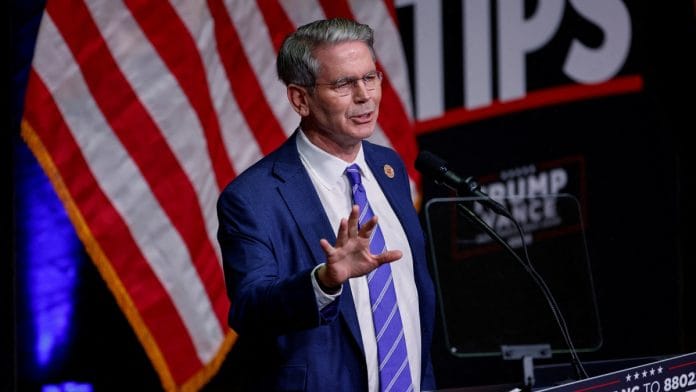New Delhi: United States Treasury Secretary Scott Bessent, while virtually absolving China, has accused India’s “richest families” of profiteering from Russian oil imports, in a thinly veiled swipe at Mukesh Ambani-led Reliance Industries, the most prominent private sector player in India’s oil trade.
The same is “unacceptable”, Scott Bessent said.
This comment comes only days after Donald Trump’s top adviser, Peter Navarro, unleashed an anti-India tirade claiming its profits from Russian oil benefitted “India’s politically connected energy titans”.
“India is just profiteering,” Scott Bessent further said in an interview with CNBC’s Joe Kernen, charging India with making profits from Russian oil.
“They are reselling. They made $16 billion in excess profits. Some of the richest families in India. It is what I would call the Indian arbitrage—buying cheap Russian oil and reselling it as a product—that just sprung up during the war, which is unacceptable,” he added.
Peter Navarro made a similar accusation earlier this week by labelling India “a global clearinghouse for Russian crude”. Writing in the Financial Times, Navarro alleged that US trade dollars are indirectly funding Russia’s war machine via India’s refining sector. Peter Navarro’s remarks appeared to go beyond general policy critique and seemed aimed squarely at a specific Indian corporate group.
According to a Reuters report, India now imports over 1.75 million barrels per day of Russian oil—slightly up from the same period last year—with private refiners Reliance Industries and Nayara Energy accounting for nearly half of the volume.
“India exports more than a million barrels per day in refined petroleum products, equivalent to over half the volume of crude it imports from Russia. The proceeds flow to India’s politically connected energy titans, and in turn, into Vladimir Putin’s war chest,” Peter Navarro wrote.
Navarro added, “India’s dependence on Russian crude undermines the global effort to isolate Moscow.” However, his assertion drew criticism for selective outrage, as China continues to import significantly more Russian oil than India, and Europe remains a major consumer of Russian gas, paying in hard currency.
When asked whether China was also in the wrong, Scott Bessent said, “If you go back and look now, I believe India had less than one percent of their oil from Russia pre-2022. Now it’s up to 42 percent. So, this India arbitrage is a completely different thing.”
Bessent hinted at potential trade consequences, saying the Trump administration plans to impose secondary tariffs on India for its purchases of sanctioned Russian oil.
Comparing Russian oil imports by India and China, Scott Bessent remarked, “China’s import is suboptimal.” China’s imports rose relatively modestly from 13 to 16 percent of its total portfolio, he noted.
India pushes back
India has firmly rejected accusations that its energy trade undermines global sanctions or supports Russia’s war effort. Officials argue that national interest and energy security requirements drive the purchases in a volatile, globalised market.
Comparing with 2024, government data shows India’s April-July Russian oil imports down by 10 percent this year and its oil imports from the US up by 12 percent.
Indian officials note that the surge in Russian crude began only after the implementation of the $60-per-barrel price cap announced at the G7 Summit, making such oil economically attractive for developing economies.
India, the world’s third-largest oil importer, maintains that its purchases comply with international law and serve domestic economic priorities.
India’s oil trade is under fire as the Trump administration seeks to revive stalled Russia-Ukraine peace talks. A symbolic US-Russia summit in Alaska earlier this month brought President Trump and President Vladimir Putin face-to-face for the first time in four years.
“Alaska was a show of force,” Scott Bessent said in the CNBC interview. “It was like inviting your uncontrollable neighbour over and showing him your gun case.”
Ukrainian President Volodymyr Zelenskyy will be in the US for the trilateral talks, aimed at restarting the peace process.
“My strong belief is that there will be a bilateral meeting between President Putin and President Zelensky,” Scott Besent concluded.
(Edited by Madhurita Goswami)
Also Read: US promoting terrorism & dictatorship in the world—RSS mouthpiece days after Trump’s 50% tariff bomb






